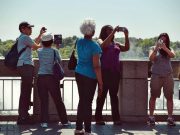In the ever-shifting tapestry of our globalized world, the intricate threads of indigenous cultures often face the risk of unraveling. These cultures, rich with unique traditions, languages, and wisdom, stand as living testaments to humanity’s diverse heritage. Yet, as the modern world encroaches, the question arises: how can these invaluable legacies be safeguarded for future generations? Enter tourism—a force often seen as a double-edged sword. While it has the potential to erode cultural authenticity, it also holds the promise of preservation and revitalization. This article delves into the complex role tourism plays in the delicate balance of sustaining and celebrating indigenous cultures, exploring how, when wielded with respect and sensitivity, it can become a powerful ally in the quest to preserve the world’s rich cultural mosaic. Tourism“>
Tourism“>
Empowering Indigenous Voices Through Tourism
Tourism has the potential to serve as a powerful conduit for the celebration and preservation of Indigenous cultures. By facilitating authentic exchanges, tourism can illuminate the rich tapestry of Indigenous traditions, languages, and histories. Local communities can offer unique insights through guided tours, storytelling sessions, and hands-on workshops that invite visitors to partake in traditional crafts and customs. These experiences not only educate but also foster a profound respect for the heritage and resilience of Indigenous peoples.
Engaging with Indigenous communities through tourism can lead to mutual benefits. It provides a platform for Indigenous voices to be heard and celebrated, ensuring that their stories and practices are passed down to future generations. Some of the key benefits include:
- Economic empowerment through sustainable tourism initiatives.
- Promotion of cultural exchange and understanding.
- Increased visibility and awareness of Indigenous issues and rights.
By supporting Indigenous-led tourism, travelers can contribute to a more equitable and inclusive global narrative, one that honors the wisdom and diversity of the world’s Indigenous cultures.

Cultural Exchange: A Two-Way Street
Tourism, when approached thoughtfully, can serve as a powerful conduit for the preservation of indigenous cultures. By facilitating interactions between travelers and native communities, it opens avenues for cultural appreciation and mutual understanding. Tourists often seek authentic experiences that connect them to the history and traditions of the places they visit. This desire encourages indigenous communities to sustain their cultural practices, ensuring that their stories, rituals, and art forms are passed down through generations. Tourism can empower these communities by providing them with a platform to showcase their heritage, which not only generates income but also fosters a sense of pride and ownership over their cultural narratives.
However, it is essential to approach cultural exchange with sensitivity and respect. Key considerations include:
- Engaging with communities to ensure that tourism initiatives align with their values and aspirations.
- Promoting responsible tourism practices that respect local customs and minimize environmental impact.
- Encouraging tourists to participate in educational programs that deepen their understanding of indigenous cultures.
By embracing these principles, tourism can evolve into a respectful and sustainable exchange that honors and preserves the rich tapestry of indigenous cultures worldwide.
Balancing Economic Growth with Cultural Integrity
In today’s globalized world, tourism stands as a double-edged sword for indigenous communities. On one hand, it offers a lucrative opportunity for economic growth, providing jobs and financial support. On the other, it risks diluting the rich cultural tapestries that define these communities. The key to navigating this delicate balance lies in empowering indigenous peoples to take charge of their narratives and ensuring that tourism development is community-led and culturally sensitive.
Strategies to preserve cultural integrity while fostering economic benefits include:
- Community Empowerment: Involve local leaders in decision-making processes to ensure that development aligns with cultural values and traditions.
- Educational Programs: Develop programs that educate tourists about the history, customs, and significance of indigenous cultures, fostering respect and understanding.
- Authentic Experiences: Encourage tourism models that promote genuine cultural exchanges rather than commodifying traditions for profit.
- Sustainable Practices: Implement eco-friendly and sustainable tourism practices that minimize environmental impact and preserve natural resources.

Guidelines for Ethical Engagement with Indigenous Communities
When engaging with Indigenous communities, it is crucial to prioritize respect and understanding. Begin by recognizing the sovereignty of these communities over their cultural heritage and lands. Listen actively and approach with humility, acknowledging the profound historical and cultural contexts that shape their current realities. Building genuine relationships should be the cornerstone of any interaction, ensuring that any tourism-related activities are mutually beneficial.
- Prioritize Consultation: Engage in open dialogue with community leaders to understand their needs and perspectives.
- Respect Sacred Sites: Ensure that cultural sites are treated with reverence and follow any guidelines set by the community.
- Support Local Economies: Choose to support Indigenous-owned businesses and initiatives to contribute positively to the community.
- Promote Cultural Exchange: Facilitate opportunities for authentic cultural sharing, ensuring that narratives are controlled by the community.
By adhering to these principles, tourism can become a powerful tool in preserving and celebrating the rich tapestry of Indigenous cultures, while fostering sustainable development and intercultural understanding.
In Conclusion
As we draw the curtain on our exploration of the intricate dance between tourism and the preservation of Indigenous cultures, it becomes clear that this relationship is both a delicate balance and a powerful opportunity. Like the gentle ripple of a pebble cast into a tranquil pond, tourism holds the potential to spread awareness, foster appreciation, and breathe new life into traditions that have withstood the test of time. Yet, it also carries the weighty responsibility of ensuring that these cultural treasures are not commodified or diluted in the process.
As travelers, storytellers, and global citizens, we stand at a crossroads where mindful engagement can lead to a future where cultural heritage is not only preserved but celebrated in its authentic form. The road ahead invites us to listen, learn, and act with intention, recognizing that each journey we embark upon is not just a passage through space, but a bridge between past and present, tradition and transformation.
Let us walk this path with respect and curiosity, understanding that the true essence of travel lies not in the places we visit, but in the connections we forge and the wisdom we glean. In doing so, we honor the rich tapestries of Indigenous cultures and contribute to a world where diversity is cherished, and heritage is preserved for generations yet to come.

































